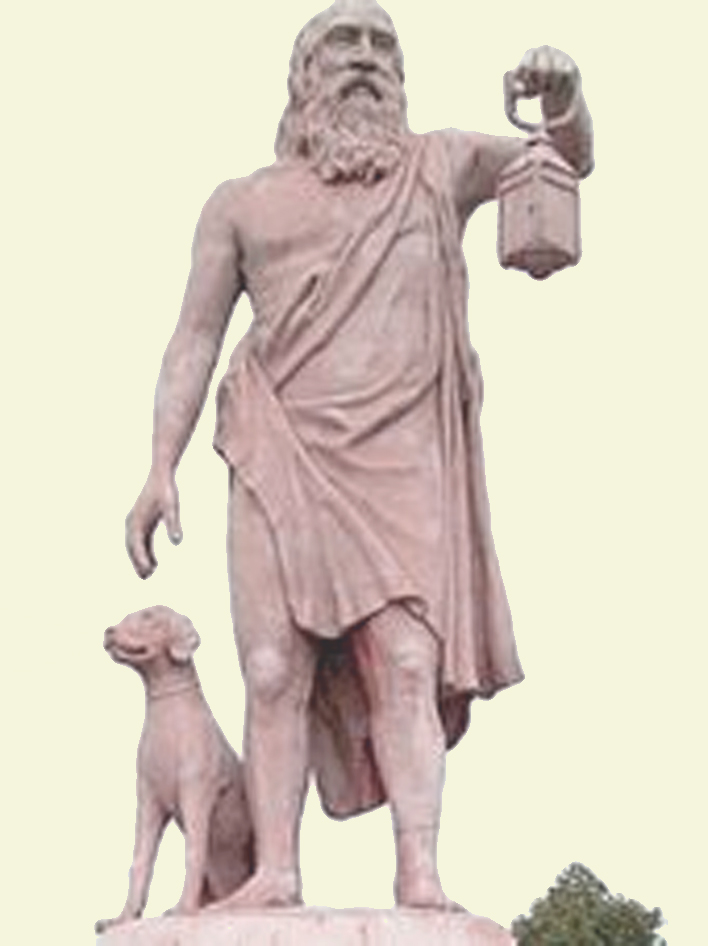the Cynic
 Index
Index 
20141211 20131113 Acceptance Morality
Summary biography and revealing anecdotes Copied from The Columbia Electronic Encyclopedia® Copyright © 2013, Columbia University Press, available at TheFreeDictionary Diogenes (dīŏj`ənēz), c.412–323 B.C., Greek Cynic philosopher; pupil of Antisthenes. He was born in Sinope and lived in Athens. He taught that the virtuous life is the simple life, and he dramatically discarded conventional comforts, living in a tub. He is said to have thrown away his last utensil, a cup, when he saw a peasant drink from his hands. When Alexander the Great asked what he might do for him, Diogenes said, "Only step out of my sunlight."Acceptance His daylight quest with a lantern for an honest man was probably the most striking expression of his contempt for his generation. Morality The following warning from the free dictionary seems very strange, as it immediately follows the above definition. The paragraph the warning is about seems quite reasonable to me, but because we all know the Soviet Union had an ideological communistic agenda, we need to warn about their suspect opinions. Of course we don't have such an agenda because our ideals, including democracy, human rights, and market competition (e.g. among publishers), are self-evident goods that lead to the best "truth" available, nez pas? Warning! The following article is from The Great Soviet Encyclopedia (1979). It might be outdated or ideologically biased. Diogenes: Born circa 404 B.C.; died circa 323 B.C. Ancient Greek philosopher. A disciple of Antisthenes, the founder of the school of Cynics, Diogenes developed the master’s doctrine along the lines of a naive materialism. He rejected civilization, particularly the state; declared culture to be an act of violence against human nature; and demanded that man return to a primitive condition. Diogenes declared himself to be a citizen of the world and advocated a communality of wives and children. He carried his indifference to morality and societal life to the point of complete equanimity to any of the inconveniences of life. According to apocryphal anecdotes Diogenes used to live in a tub, and, when Alexander the Great asked what Diogenes would like from him, he answered, “Move away and don’t block my sunlight.” Diogenes criticized Plato’s doctrine of ideas from the point of view of an extreme sensualism, recognizing only the particular. Together with the Sophists he also propounded the contradictions between natural endowment and human institutions. Diogenes rejected pol ytheism and religious cults as arbitrary human institutions, and he acknowledged only ascetic virtue, based on an imitation of nature. In this he found man’s sole purpose. | |
 Statue of Diogenes accompanied by his dog at birthplace in Sinope, Turkey; clothed in rags, carrying a lantern looking for honest person in daylight (image from Wikipedia) |
Part of Wikipedia entry for Diogenes the Cynic On the indecency of his masturbating in public he would say, "If only it were as easy to banish hunger by rubbing my belly." Many anecdotes of Diogenes refer to his dog-like behavior, and his praise of a dog's virtues. When asked why he was called a dog he replied, "I fawn on those who give me anything, I yelp at those who refuse, and I set my teeth in rascals."Diogenes believed human beings live artificially and hypocritically and would do well to study the dog. Besides performing natural body functions in public with ease, a dog will eat anything, and make no fuss about where to sleep. Dogs live in the present without anxiety, and have no use for the pretensions of abstract philosophy. In addition to these virtues, dogs know instinctively who is friend and who is foe. Unlike human beings who either dupe others or are duped, dogs will give an honest bark at the truth. Diogenes stated that "other dogs bite their enemies, I bite my friends to save the m." The term "cynic" itself derives from the Greek word κυνικός, kynikos, "dog-like" and that from κύων, kyôn, "dog". As a later commentator explained: "There are four reasons why the Cynics are named after dogs:" • First because of the indifference of their way of life for they eat and make love in public, go without shoes, and sleep in tubs and at crossroads. • The second reason is that the dog is a shameless animal, not as being beneath modesty, but as superior to it. • The third reason is that the dog is a good guard, they guard the tenets of their philosophy. • The fourth reason is that the dog is a discriminating animal which can distinguish between its friends and enemies. |